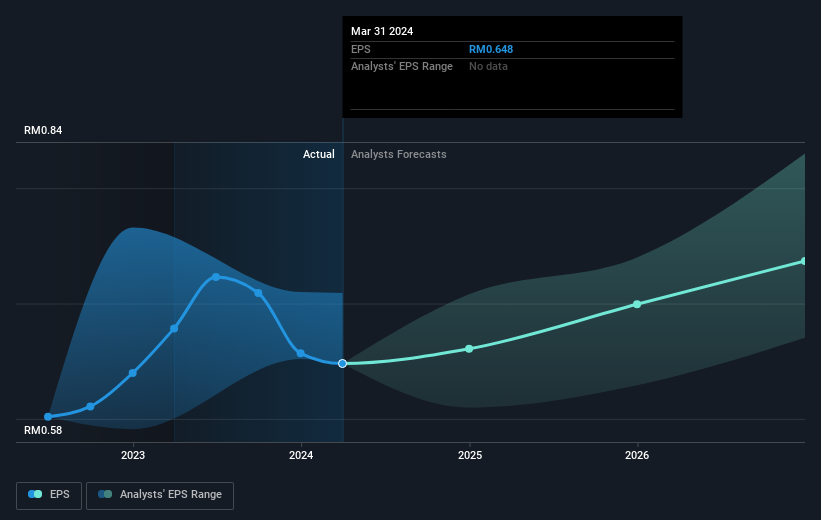RHB Bank Berhad (KLSE:RHBBANK) jumps 4.8% this week, though earnings growth is still tracking behind three-year shareholder returns

One simple way to benefit from the stock market is to buy an index fund. But if you choose individual stocks with prowess, you can make superior returns. Just take a look at RHB Bank Berhad (KLSE:RHBBANK), which is up 11%, over three years, soundly beating the market return of 8.8% (not including dividends). On the other hand, the returns haven't been quite so good recently, with shareholders up just 12%, including dividends.
Since the stock has added RM1.2b to its market cap in the past week alone, let's see if underlying performance has been driving long-term returns.
Check out our latest analysis for RHB Bank Berhad
In his essay The Superinvestors of Graham-and-Doddsville Warren Buffett described how share prices do not always rationally reflect the value of a business. By comparing earnings per share (EPS) and share price changes over time, we can get a feel for how investor attitudes to a company have morphed over time.
During three years of share price growth, RHB Bank Berhad achieved compound earnings per share growth of 7.3% per year. The average annual share price increase of 3% is actually lower than the EPS growth. So one could reasonably conclude that the market has cooled on the stock. This cautious sentiment is reflected in its (fairly low) P/E ratio of 9.30.
The company's earnings per share (over time) is depicted in the image below (click to see the exact numbers).

Dive deeper into RHB Bank Berhad's key metrics by checking this interactive graph of RHB Bank Berhad's earnings, revenue and cash flow.
What About Dividends?
When looking at investment returns, it is important to consider the difference between total shareholder return (TSR) and share price return. The TSR incorporates the value of any spin-offs or discounted capital raisings, along with any dividends, based on the assumption that the dividends are reinvested. So for companies that pay a generous dividend, the TSR is often a lot higher than the share price return. In the case of RHB Bank Berhad, it has a TSR of 37% for the last 3 years. That exceeds its share price return that we previously mentioned. The dividends paid by the company have thusly boosted the total shareholder return.
A Different Perspective
RHB Bank Berhad shareholders gained a total return of 12% during the year. But that was short of the market average. On the bright side, that's still a gain, and it's actually better than the average return of 7% over half a decade It is possible that returns will improve along with the business fundamentals. It's always interesting to track share price performance over the longer term. But to understand RHB Bank Berhad better, we need to consider many other factors. Take risks, for example - RHB Bank Berhad has 1 warning sign we think you should be aware of.
We will like RHB Bank Berhad better if we see some big insider buys. While we wait, check out this free list of undervalued stocks (mostly small caps) with considerable, recent, insider buying.
Please note, the market returns quoted in this article reflect the market weighted average returns of stocks that currently trade on Malaysian exchanges.
New: AI Stock Screener & Alerts
Our new AI Stock Screener scans the market every day to uncover opportunities.
• Dividend Powerhouses (3%+ Yield)
• Undervalued Small Caps with Insider Buying
• High growth Tech and AI Companies
Or build your own from over 50 metrics.
Have feedback on this article? Concerned about the content? Get in touch with us directly. Alternatively, email editorial-team (at) simplywallst.com.
This article by Simply Wall St is general in nature. We provide commentary based on historical data and analyst forecasts only using an unbiased methodology and our articles are not intended to be financial advice. It does not constitute a recommendation to buy or sell any stock, and does not take account of your objectives, or your financial situation. We aim to bring you long-term focused analysis driven by fundamental data. Note that our analysis may not factor in the latest price-sensitive company announcements or qualitative material. Simply Wall St has no position in any stocks mentioned.
About KLSE:RHBBANK
RHB Bank Berhad
Provides commercial banking and finance related products and services in Malaysia and internationally.
Excellent balance sheet average dividend payer.


